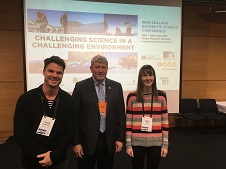 Understanding what Antarctica's environment was like 3.5 million years ago could prove crucial to preparing New Zealand for the impacts of climate change.
Understanding what Antarctica's environment was like 3.5 million years ago could prove crucial to preparing New Zealand for the impacts of climate change.
Three Otago University postgraduate students and a Victoria University postgraduate student were last night awarded postgraduate scholarships by Antarctic New Zealand for their work to better understand the changes occurring on the frozen continent. All three Otago students are associated with the Polar Environments Research Theme.
The presentations were held at Otago Museum as part of the New Zealand Antarctic Science Conference. Otago University Masters students Holly Still and Lisa Craw were awarded scholarships for their research with the larger Ross Ice Shelf Programme. This research aims to understand the processes driving the largest ice shelf on Earth and how it will respond to a changing climate.
Daniel Lowry, a first year PhD student at Victoria University's Antarctic Research Centre, has been awarded a prestigious Sir Robin Irvine Scholarship for his work to model the rapid changes to the Ross Ice Shelf.
Otago University PhD student Jacob Anderson has also been awarded a Sir Robin Irvine Scholarship for his research on constructing what the environment was like over 3 million years ago, when scientists believe there was as much carbon dioxide in the atmosphere as there is today. Sea levels were up to 10 metres higher, mega-toothed sharks prowled the oceans, and the global average temperature was 2-3°C warmer.
Jacob Anderson's research involves analysing ancient microbes in the Antarctic permafrost, the DNA of which could provide vital information to fill the gap of current knowledge.
“Unlocking information from bacteria could provide us with the missing link on how current changes to our climate will ultimately impact us.” Jacob Anderson says.
The $20,000 grant will allow Jacob to travel to Antarctica to collect specimens, and conduct specialist laboratory work in Sydney to process the samples.
“Understanding how the environment and climate is likely to change is crucial to our economy in terms of agriculture and fisheries, and how we can mitigate and adapt appropriately,” Jacob Anderson says.
Antarctica New Zealand chief executive Peter Beggs says there were an unprecedented number of very high standard applications received, which were assessed by a panel of expert scientists.
“The changing climate makes scientific work in Antarctica more important than ever. The scholarships are a really important way to support new generation researchers to explore questions that could have a major bearing on Antarctica's, and the world's, future” Peter Beggs says.
The dominance of our students at this year's awards ceremony demonstrates the strength and excellence of the Otago Polar research community - Dr Christian Ohneiser, Director of the Polar Environments Research Theme.
Antarctica New Zealand is grateful to scholarship sponsors New Zealand Post and the New Zealand Antarctic Research Institute.
The New Zealand Antarctic Science Conference, being attended by over 150 scientists, policy advisors and science communicators from New Zealand and around the world, is being held in Dunedin over the next two days.
The University of Otago Polar Environments Research Theme has been instrumental in attracting the conference to Dunedin.
"The Research theme is motivated by the urgent need to understand the effects of global change on the polar region and emphasises the need to work across diverse disciplines on varying spatial and temporal scales. The theme is designed to foster interdisciplinary research that links observations made in the field, in the lab, and from space with mathematical models in pursuit of process understanding. The theme nurtures new and emerging scientists, including students undertaking research in these areas" says Dr Christian Ohneiser, Director of the Polar Environments Research Theme."
"The dominance of our students at this year's awards ceremony demonstrates the strength and excellence of the Otago Polar research community” he proudly concluded.
Content Sourced from scoop.co.nz
Photo: New Zealand Antarctic Research Institute director, Professor Gary Wilson with two of its scholarship recipients, Jacob Anderson (PhD, Department of Marine Science) and Holly Still (MSc, School of Surveying).
Absent: Lisa Craw (MSc, Department of Geology).
